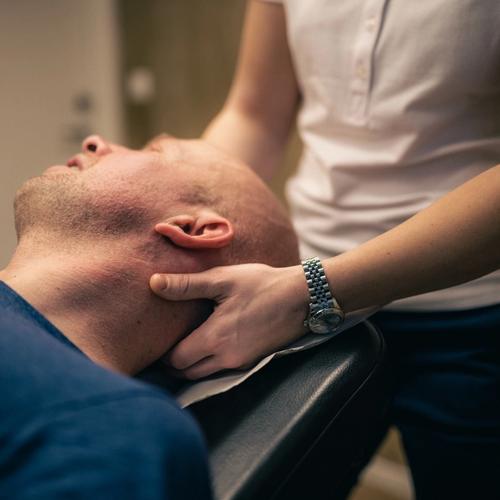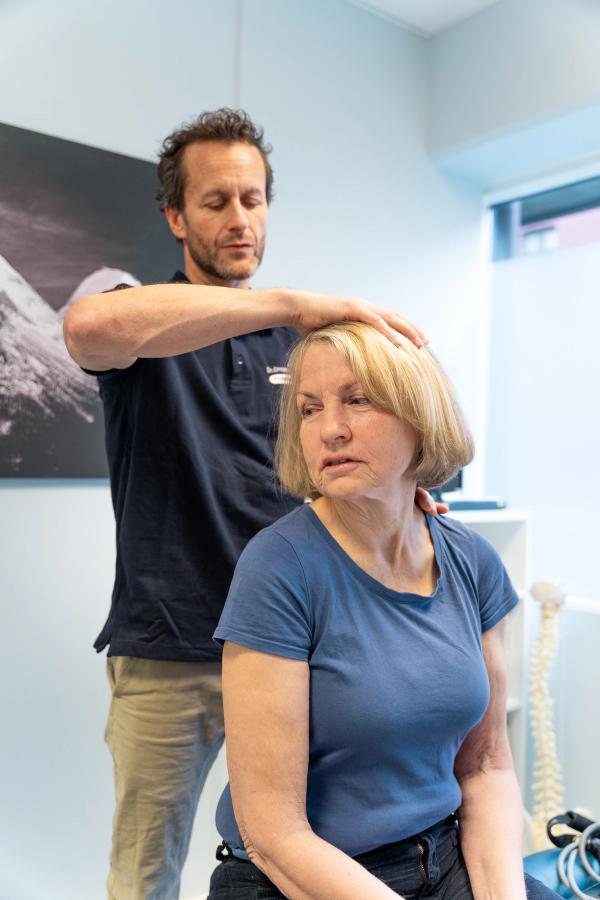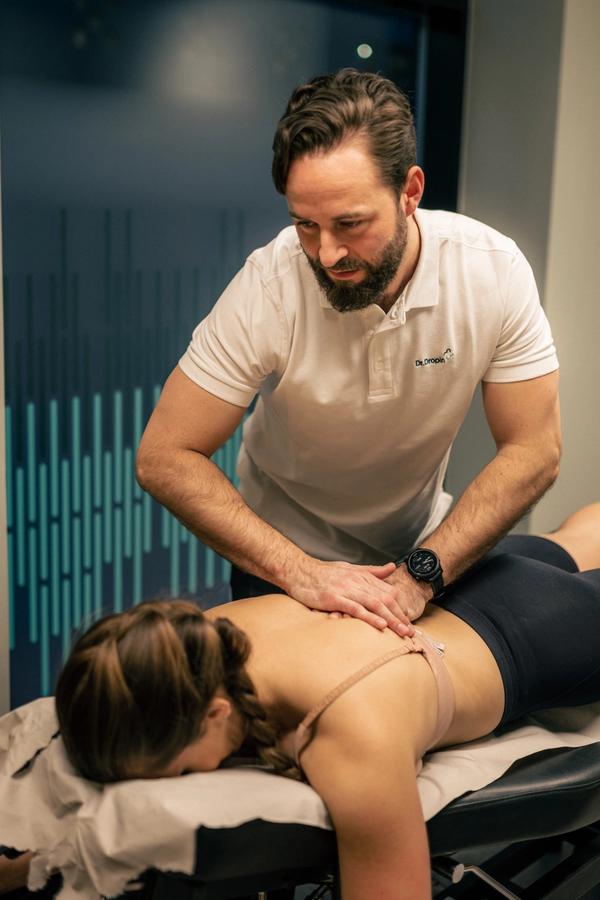Cervicogenic headache
Cervicogenic headache is a condition that involves pain originating from the neck and may radiate to the head. This type of headache typically occurs as a result of issues in the neck, such as tight muscles, reduced joint mobility, or irritation of nerve roots in the neck. Triggering factors often include prolonged incorrect posture, stress, or neck injuries.
At Dr. Dropin, we have skilled practitioners who can assess your elbow pain and help you receive the appropriate treatment.
See availability
What are you looking for?
Symptoms of cervicogenic headache
If you suffer from cervicogenic headache, you may experience one or more of the following symptoms:
- Head pain, often radiating from the neck
- Pain that can worsen with movement of the head or neck
- Increased discomfort after prolonged periods of sitting or unfavorable neck positioning
- Normally causes one-sided headache
Cervicogenic headache is a condition that can develop gradually, and symptoms can vary in intensity. It is important to seek professional guidance for an accurate diagnosis and appropriate treatment if you are experiencing these symptoms.
See availability
Treatment
Treatment for cervicogenic headache often involves various approaches to achieve specific treatment goals. Here are some common focus areas in the treatment:
- Pain Relief: Through manual techniques such as neck adjustments, massage, and trigger point therapy, head and neck pain can be reduced.
- Increased Flexibility: Specific stretching exercises and techniques can help improve the mobility of the neck.
- Strength Training: Gradual introduction of strength exercises for the muscles in the neck can help reduce the strain on the areas causing the headache.
- Biomechanical Evaluation: Analysis of posture and movement patterns, as well as adjustment of ergonomic factors such as pillows and chairs, to reduce strain on the neck.
- Functional Rehabilitation: Gradually resume daily activities, with a focus on restoring optimal function in the neck.
It's important to understand that the treatment for cervicogenic headache should be tailored to individual needs and may vary from person to person. A thorough evaluation and close collaboration with an experienced physiotherapist or chiropractor are crucial for developing an effective treatment plan.
See availabilityWhen should you book an appointment?
If you recognize the symptoms above and are experiencing any of the following issues, we recommend seeking professional guidance:
- Pain or reduced mobility that has persisted for more than a week without improvement.
- Severe symptoms that you need assistance in reducing quickly.
- Symptoms that cause you concern or that you believe may be due to more serious conditions.
Remember that early assistance from a therapist can reduce the duration of your issues and contribute to achieving the best possible outcome. You should never worry that your problems are "too small" - we take all types of issues seriously.
See availability
Meet our therapists
Our physical team consists of skilled and committed therapists. We have solid expertise, clinical experience and Norwegian authorization, so you can trust that you get the help you need. You do not need a referral to book an appointment with us.
We know that the right competence and good chemistry are important. Below you can therefore get to know our therapists better.


Daniel Vestøl
Chiropractor, Bislett
General Chiropractic | Headache | Acute and prolonged dizziness | Prolonged pain

Lovisa Klingenberg
Chiropractor, Økern
General Chiropractic | Acute and prolonged dizziness | Prolonged pain | Diagnostic ultrasound

Hildegunn Lilja Solsvik
Physiotherapist, Majorstuen
General physiotherapy | Psychomotor physiotherapy | Acute and long-term dizziness | Vestibular disorders | Tinnitus | Meniere's disease

Wictor Borgström
Physiotherapist, Sandvika
General Physiotherapy | Rehabilitation | Acute and prolonged dizziness

Heidi Prytz
Chiropractor
General Chiropractic | Back | Neck | Women's Health | Needle treatment | Headache

Ana-Maria Stefan
Chiropractor, Majorstuen
General Chiropractic | Headache | Women's Health | Pregnancy | Prolonged pain

Ingrid-Johanne Nilsen
Chiropractor, Bergen city center
General Chiropractic | Headache | Women's health | Pregnancy

Lina Beate Varhaug
Chiropractor, Stavanger sentrum
General Chiropractic | Back | Neck | Women's Health | Pregnancy | Shock wave therapy | Headache | Dizziness

Nikolai Nyenget
Chiropractor, Trondheim city center
General Chiropractic | Sports injuries | Shock wave treatment | Foot analysis and sole fitting | Plantar fasciitis | Headache
Use your health insurance
We cooperate with all the major insurance companies, so that you can use your health insurance with us if you have foot pain or other problems.
Read more about how to use your health insurance here
What can you do by yourself?
Although the treatment for cervicogenic headache typically involves professional guidance and therapy, there are several measures you can take on your own to alleviate symptoms and improve the condition:
- Follow recommended exercises: If you have been given home exercises by your therapist, it is essential to perform them regularly.
- Stay active: Do not completely stop activities that may trigger symptoms. If you can engage in short activities without experiencing pain, this is usually acceptable.
- Pain relief: Pain can sometimes be reduced by using an ice pack, heating pad, a warm shower, or by performing gentle movements.
- Medications: Use over-the-counter pain relievers as directed by healthcare professionals.
- Adapt activities: Avoid activities that lead to prolonged worsening of the headache (more than 12 hours).
- Communicate well with your therapist: So that the treatment plan can be adjusted to any changes you experience.
If you have not yet had the condition examined or have deviated from the treatment plan, it is recommended to contact healthcare professionals for further guidance."
See availabilityFrequently asked questions about cervicogenic headache's
Can a stiff neck cause headaches?
Yes, a stiff neck can lead to a headache. Neck stiffness can affect muscles and nerves in the neck, and the pain can radiate up to the head, resulting in a headache. This phenomenon is known as cervicogenic headache, where pain originating from the neck can extend to the head and cause discomfort.
Can a stiff neck cause headaches?
Yes, a stiff neck can lead to a headache. Neck stiffness can affect muscles and nerves in the neck, and the pain can radiate up to the head, resulting in a headache. This phenomenon is known as cervicogenic headache, where pain originating from the neck can extend to the head and cause discomfort.
Can cervicogenic headache be prevented?
Some preventive measures include maintaining good posture, regular exercise, and addressing stressors that may contribute to neck issues.
Can cervicogenic headache be prevented?
Some preventive measures include maintaining good posture, regular exercise, and addressing stressors that may contribute to neck issues.
How should one lie down when experiencing neck pain?
When you have neck pain, it's best to lie with a supportive pillow and keep your neck in a neutral position to alleviate discomfort.
How should one lie down when experiencing neck pain?
When you have neck pain, it's best to lie with a supportive pillow and keep your neck in a neutral position to alleviate discomfort.
How is cervicogenic headache diagnosed?
Diagnosis often involves a thorough examination by a healthcare professional, including a review of medical history and possibly imaging tests.
How is cervicogenic headache diagnosed?
Diagnosis often involves a thorough examination by a healthcare professional, including a review of medical history and possibly imaging tests.